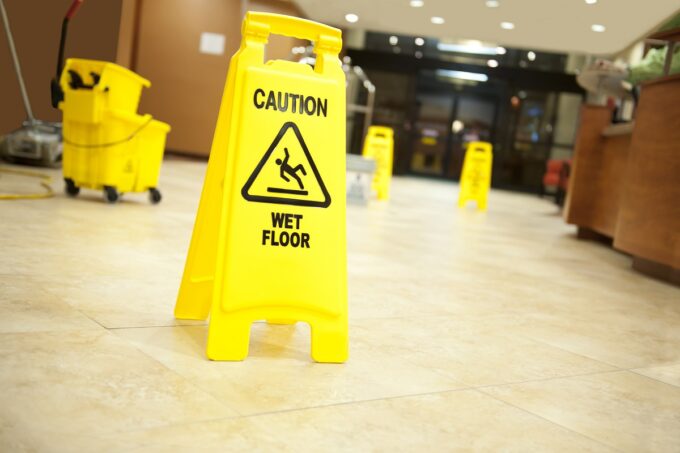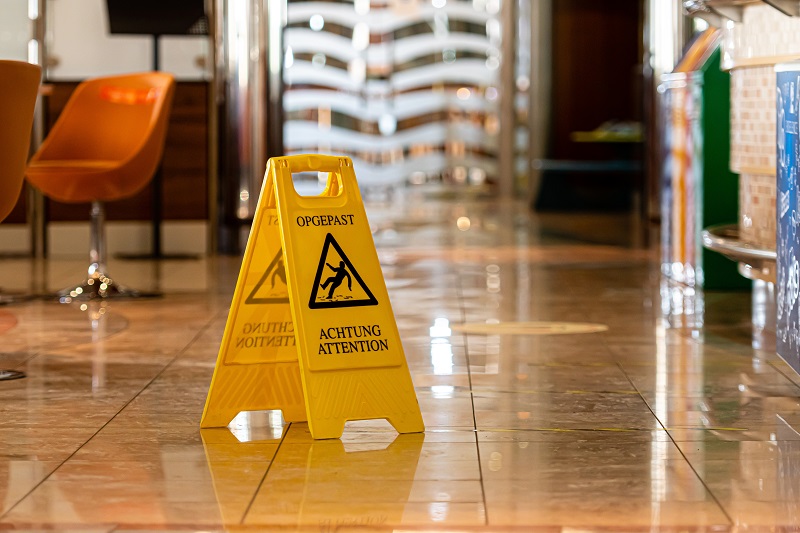In the bustling world of business, where foot traffic and commerce intersect, a main concern stands tall: customer safety. Behind every successful enterprise lies a web of legal responsibilities that businesses must weave through to ensure the well-being of their customers. From the local coffee shop to the grand shopping mall, the prevention of customer accidents isn’t just a moral obligation—it’s a strategic imperative for a successful business.
Understanding Business Liability

As customers navigate the terrain of your establishment, an invisible cloak of liability wraps around your business. This cloak, while unseen, carries significant weight. Should a customer slip on a wet floor, trip over uneven pavement, or encounter any other unforeseen circumstance, your business’s legal standing could come under the spotlight. This isn’t merely about ethics; it’s a matter of legal accountability and doing the right thing.
Creating a Safe Environment
A business’s first line of defense in the battle against customer accidents is a well-maintained environment. The battleground? Your business premises. Every spill, every loose tile, every neglected maintenance task is a potential hazard lying in wait.
By prioritizing regular inspections and addressing even the smallest issues, you’re essentially safeguarding not just your business’s reputation, but its very livelihood.
Employee Training and Awareness
In the symphony of customer safety, your employees are the conductors. Proper training equips them with the knowledge and skills to steer customers clear of harm’s way. Whether it’s the correct way to lift heavy objects or the protocol for dealing with emergency situations, well-prepared employees are your orchestra of prevention.
Clear Signage and Communication

Imagine navigating unfamiliar terrain without a map. That’s precisely how customers feel without clear signage indicating potential hazards. A simple “Caution: Wet Floor” sign can prevent countless customer accidents.
But it’s not just about signs—it’s about communicating safety measures to your customers. From construction zones to areas prone to slipping, communication isn’t just courteous; it’s a sign of a business that genuinely cares.
Promptly Addressing Customer Concerns
Customer feedback isn’t just a pat on the back; it’s a direct line to improving safety. When customers voice concerns about potential hazards, it’s imperative to address them swiftly.
A spill left unattended, a flickering light, or a loose railing—all these seemingly minor issues can escalate into major safety threats. By listening and acting, you demonstrate that safety is non-negotiable.
Regular Maintenance and Upkeep

Just as a well-tuned instrument produces harmonious melodies, a well-maintained business environment generates a symphony of safety.
Regular maintenance—be it servicing equipment or fixing structural flaws—is the bedrock of accident prevention. Ignoring maintenance is akin to playing a sour note in the safety concerto.
Emergency Response Preparedness
No script is complete without a contingency plan. When unforeseen emergencies strike—be it a fire, a medical crisis, or a sudden evacuation—your employees should be the well-rehearsed cast guiding customers to safety. Emergency response isn’t just a matter of duty; it’s an expression of responsibility.
Documenting Safety Measures
In the legal theater, documentation is your script, your director’s notes, and your performance history all rolled into one. Detailed records of safety protocols, employee training sessions, and maintenance schedules aren’t just bureaucratic formalities; they’re the evidence of your commitment to safeguarding customers.
Consulting Legal Experts

Navigating the maze of legal intricacies can be daunting. This is where legal experts step into the limelight. Personal injury lawyers are your backstage crew, ensuring that every scene is set for a safe performance. Consulting these experts can provide businesses with a nuanced understanding of their legal obligations and empower them to fortify their safety measures.
As businesses weave the tapestry of commerce, the thread of customer safety must run through every stitch. Prevention isn’t just a strategy—it’s a duty. By embracing best practices, maintaining vigilant awareness, and consulting legal experts, businesses can curate a secure environment for their patrons.
In this dance between ethics and legality, each step towards accident prevention isn’t just a stride—it’s a commitment to fostering a safer, more resilient business landscape.
Embracing Safety for a Flourishing Future
In this era of heightened awareness, customers are more than consumers; they’re discerning judges of safety. The businesses that prioritize customer well-being weave themselves into the fabric of trust, fostering loyalty that transcends transactions. It’s not just about preventing customer accidents; it’s about cultivating an environment where customers feel valued, protected, and respected.
The steps outlined in this discourse—from meticulous maintenance to vigilant employee training—form a tapestry of prevention. Each thread contributes to a safer business landscape, a canvas where accidents aren’t dismissed as inevitable, but averted through proactive measures.
As your business endeavors navigate the currents of commerce, remember that safety isn’t an accessory; it’s a centerpiece. By embracing best practices, prioritizing customer well-being, and seeking expert legal guidance, you’re not just minimizing business liability; you’re championing a culture of safety that resonates far beyond the confines of your establishment.
The stage is set, the lines are delivered, and the audience—your customers—is waiting. Every precaution taken, every hazard averted, every customer accident prevented is a standing ovation to the commitment you’ve made to their safety. It’s a standing ovation to a future where businesses flourish, not just economically, but ethically and responsibly.
In this grand production of business, where every act is intertwined with legal and moral responsibilities, remember that the final applause isn’t just for your success—it’s for the assurance you provide, the protection you uphold, and the trust you’ve earned. As the curtain falls on this discourse, let it rise on a future where businesses stand tall, having not only thrived in commerce but also triumphed in safeguarding their most precious asset: their customers.









